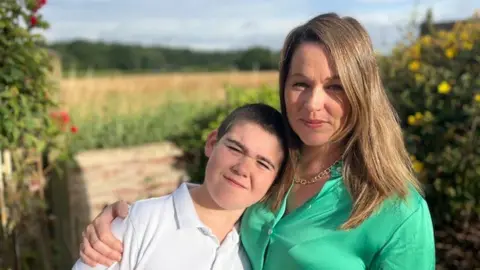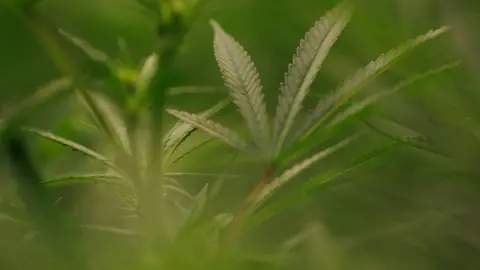Medical cannabis: Parents 'denied it turn to illegal means for children'
 Hannah Deacon
Hannah DeaconA woman whose son uses medical cannabis from the NHS fears families of hundreds of children denied the treatment feel forced to get the drug illegally.
Alfie Dingley, 12, who has a severe genetic epilepsy, was granted a licence to use cannabis oil five years ago.
But, he is one of fewer than five NHS patients to receive it, since treatments were legalised.
The government has said that more research is required before treatments are prescribed by the NHS routinely.
However Alfie's mother Hannah Deacon said families were being forced to resort to illegal means because doctors were "refusing to... or can't help them".
March on Westminster
"They're already very vulnerable people with very vulnerable children being pushed in to a place where they're having to act illegally," she said.
Ms Deacon, co-founder of the Medcan Family Foundation, marched with about 40 others from Evelina London Children's Hospital to Westminster on Tuesday to lobby the government for change.
The campaigner, from Kenilworth, said doctors faced too much bureaucracy, and called on the prime minister "to step in and sort this out".
 Reuters
Reuters"[The government] changed the law to allow access to these drugs and the reality is that the policy has failed, the funding is not available to doctors," she said.
"We are asking them to clarify that pathway so that doctors, when they do want to prescribe, they can."
"Until they do children will die or children will continue to use illegal cannabis."
Cannabis-based medicines available on the NHS are Sativex, to treat adults with multiple sclerosis and Epidyolex, for the treatment of two forms of epilepsy.
Nabilone is also used to treat severe nausea and vomiting caused by chemotherapy.
'Evidence-based approach'
GPs can only prescribe cannabis-based products under the direction of a specialist doctor in a shared care agreement, the government said.
In exceptional circumstances, NHS specialists may submit an individual funding request, which is then assessed by an independent panel.
The government added clinical guidelines from the National Institute for Health and Care Excellence (NICE) demonstrated a need for more research to support routine NHS prescribing.
"Licensed cannabis-based medicines are routinely funded by the NHS where there is clear evidence of their quality, safety and effectiveness," a Department of Health and Social Care spokesperson said.
"We are taking an evidence-based approach to unlicensed cannabis based treatments to ensure they are proved safe and effective before they can be considered for rollout on the NHS more widely."
The government said it continued to call for manufacturers to conduct research and worked closely with partners to establish clinical trials.
'Absolutely disgraceful'
Ms Deacon said Alfie, who is also autistic, has been seizure free for three and a half years and was attending school regularly and "enjoying his life".
"[But] Alfie has a prescription and these other children don't and that's not fair and that's not acceptable," she said.
Families have told the foundation they pay up to £2,000 a month for private prescriptions, available from just two prescribers, she said.
"They're having to fundraise, to ask their families for money, their friends for money to pay for their situation," Ms Deacon said.
"It's just absolutely disgraceful what these families are going through."
She estimated "hundreds, if not thousands" were turning to illegal cannabis, and called for it to be considered differently to other medicines.
"The government and the NHS are trying to push it in to this pharmaceutical paradigm but it's not that, it's a botanical," she said.
"We can make it safe, we can make it efficacious. We need to look at everything in a different way."

Follow BBC West Midlands on Facebook, X and Instagram. Send your story ideas to: [email protected]
